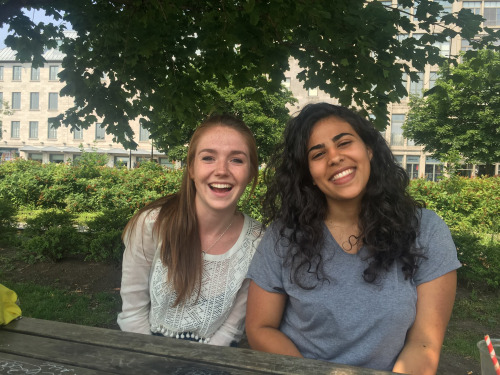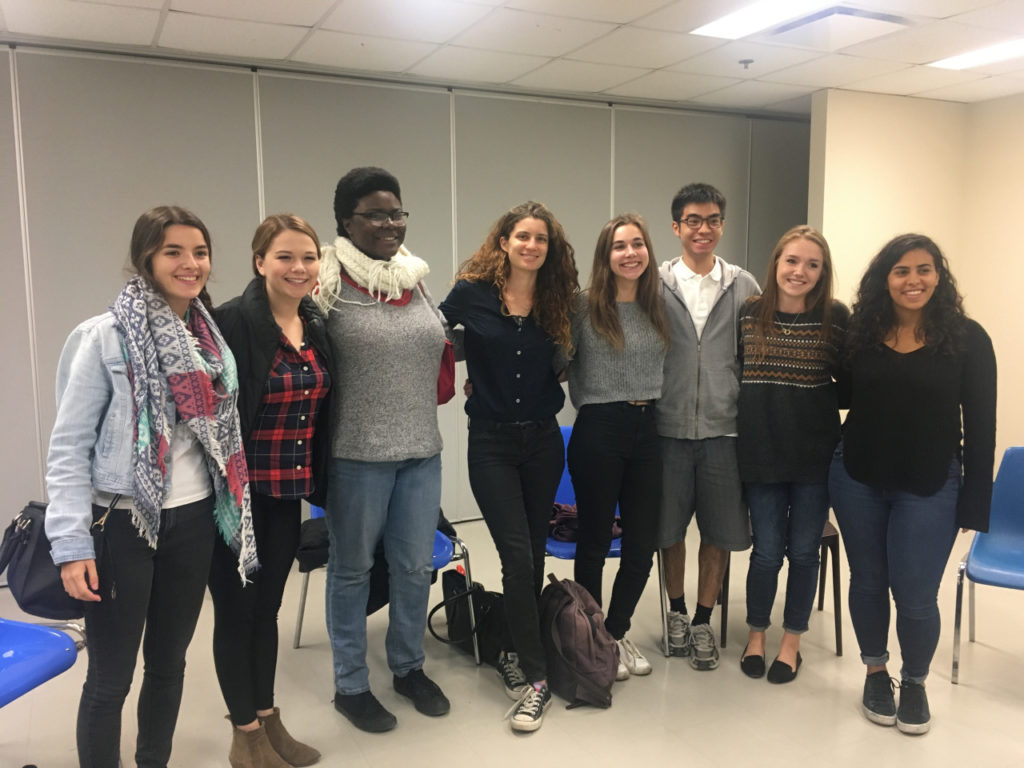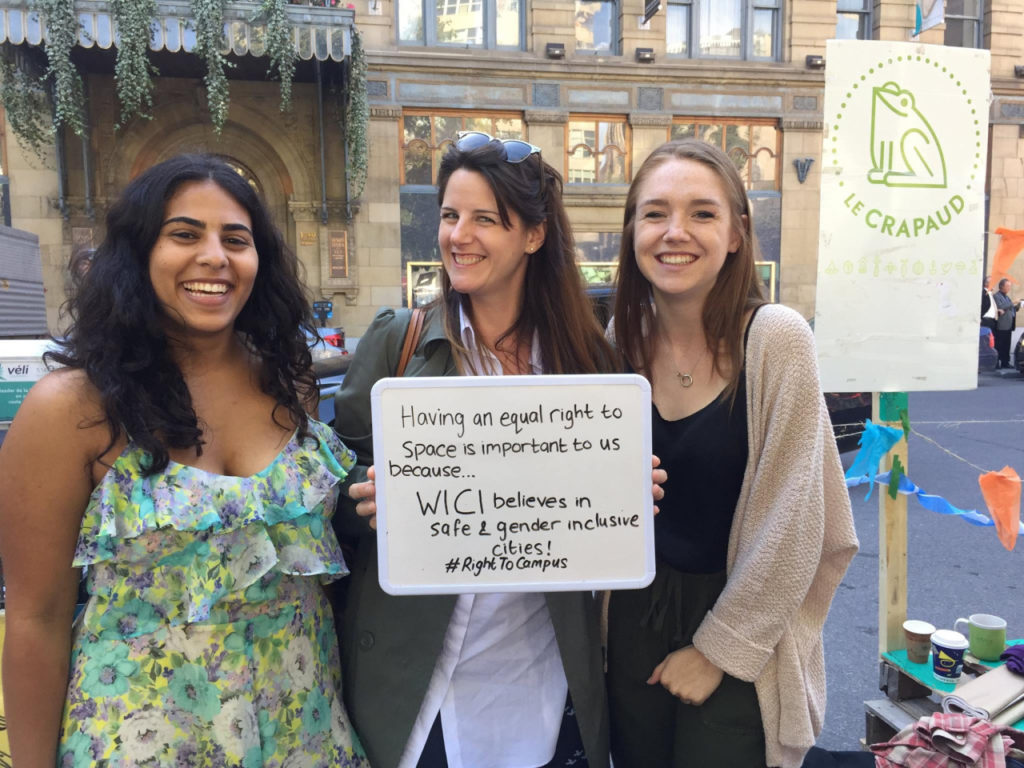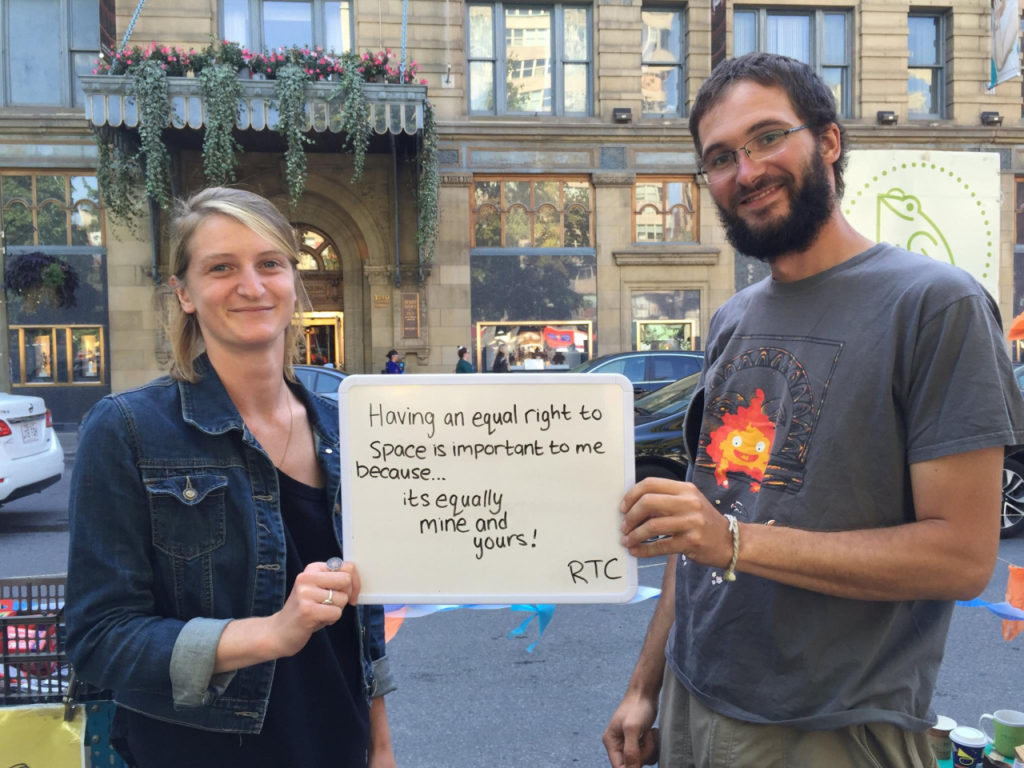An interview with Arianne Kent and Dina Al Shawwa from Women in Cities International’s Right to Campus Campaign
Alexandra Jurecko, Montreal, Canada, SSH Blog Correspondent

Arianne Kent and Dina Al Shawwa met this summer during their research internship at Women in Cities International. In June, they started work on their own project, Right to Campus, which brings WICI’s goals and tactics to McGill University in Montreal. Both Dina and Arianne are students at the university, with Dina being in her fifth year of Civil Engineering and Women’s Studies, and Arianne in her third year of studying Sociology and Women Studies.
“The idea is to take what Women in Cities International does and bring it onto campus,” says Arianne. “More broadly,” adds Dina, “we’re implementing the concepts of the larger Right to the City movement”. “What we want to do is to create more inclusive spaces on campus,” Arianne goes on, “Campus space should be equitable and safe for everyone. No one should have to bend and mold and make themselves uncomfortable to fit in the McGill space.”
Their first effort on campus was to incorporate the Right to Campus principles into the training for the university’s orientation week. “I was an orientation leader two years ago,” explains Arianne, “and I saw a lot of problems with this. As orientation leaders we’re kind of on the front line, we’re the first people who meet all these incoming students and we have a huge responsibility of conveying what’s acceptable behaviour as a McGill student. That covers everything from consent, respect, anti-discrimination, safety, all these complicated concepts that you’re trying to relay to these incoming students and we weren’t equipped enough to do so from our training.”
In preparation for the event, Dina and Arianne worked alongside the orientation development coordinator: “We were trying to reframe the entire training in terms of space,” says Dina. “We were working within the system to improve the training itself. We thought if we reframe it in terms of space, we can explain that excluding someone from a group is taking away their right to space within that group.” According to Arianne and Dina, it is crucial to change the space itself to be accommodating for everyone rather than asking people to fit in. “The space needs to be comfortable for everyone in order for people to even want the right to space,” they explain.

For orientation week, they prepared a Frosh zine and guidelines that could be applied to different scenarios, as well as a summary of campus and Montreal resources. During Community Engagement Day in September, the team lead a series of safety audits to explore issues of security and use of space on campus. “We recruited volunteers and walked them through the process of a safety audit which involves looking at different features of the social environment and we got their feedback and opinions,” remembers Arianne. “McGill security does their own official safety audits checking whether lighting is up to par and whether everything is technically safe, but we thought it would be interesting for students to do it as well since they are the ones who primarily use the space. And, student opinions might differ vastly from those of adults and security personnel.”
The group has since been invited to join McGill campus security on their annual safety walks and they are further planning on writing up a report covering the findings from their student-led safety audits: “We’re talking to them now about perhaps using our checklist for safety audits, which is based on the principles of design for safety, on their walks.”

Right to Campus’ first goal is to get students involved and talking. “We want to make campus safety everyone’s responsibility and not only women’s responsibility,” stresses Arianne. “Too often the message is that it’s women’s job to make sure they are safe, but men pay an equal part in this.” Arianne and Dina hope that through starting the conversation and by engaging people through their on-campus events, they will establish their ideas for campus safety and right to space among their fellow students: “We think that’s where tangible things grow from.”
These themes occupy Dina and Arianne also in their own academic research. As a Civil Engineering student, Dina wants to explore how to implement safety in people’s minds as well as in the physical environment. “I’m especially interested in the role of Engineers in the built environment that determines people’s perception of safety,” explains Dina. “I’m using safety audits to understand how people’s identity influences how they perceive safety on campus and at the same time I’m trying to understand how identity plays a role in that perception.”
 For their next project, the Right to Campus team is planning an art show in spring next year. “We want to ask people what right to space means to them. It can be any personal interpretation of space”, says Dina, “how they feel in space, how they navigate that space.” In the long run, Dina and Arianna are hoping to expand Right to Campus from McGill University and implement the campaign on university campuses worldwide: “We want to take the Right to Campus toolkit to other universities in Montreal, Canada and across the world and make it a resource for students everywhere.”
For their next project, the Right to Campus team is planning an art show in spring next year. “We want to ask people what right to space means to them. It can be any personal interpretation of space”, says Dina, “how they feel in space, how they navigate that space.” In the long run, Dina and Arianna are hoping to expand Right to Campus from McGill University and implement the campaign on university campuses worldwide: “We want to take the Right to Campus toolkit to other universities in Montreal, Canada and across the world and make it a resource for students everywhere.”
Alexandra is a freelance writer and recent graduate of Heidelberg University in Germany, where she earned a BA in South Asian Studies and English Literature. Having moved across the pond to live and work in Montreal, she now focuses on refreshing her French skills while volunteering her time to various community-outreach programs. You can follow her on twitter @alexjurecko.
